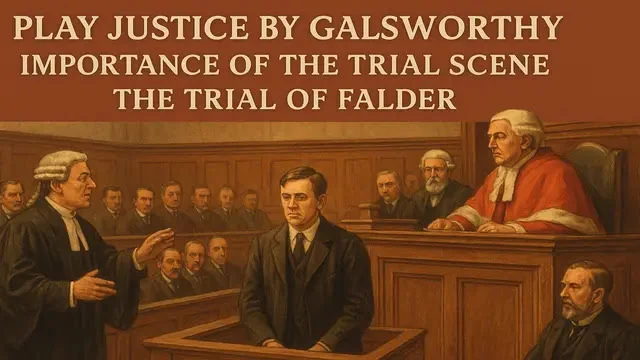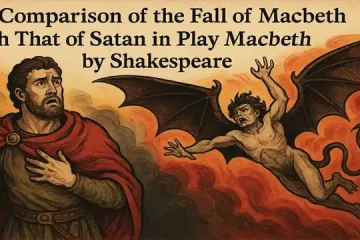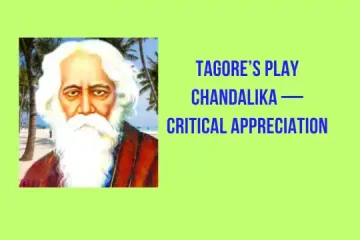The Most Interesting and Instructive Scene:
The trial of Falder is the central and most momentous part of the action of the play Justice by Galsworthy. The Second Act is the scene of a court. It is the most dominant and important scene of the play. In the trial scene of Falder, Galsworthy expresses his views on the contemporary legal system and Judicial procedure in England.
This scene reveals that law is blind and malignant power. This scene also summarizes all the views of Galsworthy about the greatest social evils with which contemporary society of England was suffering. Galsworthy presents the legal system as a heartless and inhuman process and imprisonment as a demoralizing process.
Falder’s being Tried on the Charges of Felony and Forgery:
Falder is arrested on the charge of forgery and tried in the court of law. Pleading for Falder, Mr. Frome admitted the facts of the case. But he said that the crime was committed in such a state of mental excitement and emotional crisis that the prisoner could not be held responsible for his action. Frome said that the prisoner was in a maddening fit of temporary emotional insanity when the crime was committed.
Frome’s Analysing the Circumstances:
Analysing the nature and circumstances of the case confronting Falder prior to the commission of the crime, Frome said that Falder, an inexperienced young man of twenty – three, passionately loved a woman, Ruth Honeywill. She led a very hard and miserable life under the custody of her tyrant husband. Her husband made devilish behaviour with her. He tortured her under heavy intoxication of wine. She could not get divorce from her husband on the base of harsh treatment.
One day Ruth met Falder under such pathetic and dangerous state and depicted woeful tale of her distress. Naturally a true lover like Falder must sacrifice his all for the sake of saving her life and honour. Falder wanted to help her but he had no money.
Falder’s Planning to Go Away with Ruth:
Frome further told the court that as Ruth’s life was in constant danger under her cruel husband and she could not seek a divorce. Falder could not see her in miserable condition for longer, so he decided to sail away with Ruth to some other country to start a peaceful life there like husband and wife. But all this required money which Falder did not possess at that time. Naturally he would like to arrange money to save her life from the custody of her tyrant husband.
Falder’s Altering the Figure of Cheque and Encashing it:
One morning Ruth was in an imminent danger of death. In this situation, in a fit of emotional lunacy, he altered the figures in the cheque in order to help his beloved. Mr. Frome said that this action of Falder was indeed criminal, but this should be looked from human point of view. On the 7th of July, when the cheque was altered, an extremely distressing situation had occurred. It was the question of life and death for his beloved. Falder completely lost his mental equilibrium and in the heat of this passion he committed the crime.
Cokeson Appearing as the Chief Witness:
After Frome’s statement, the witnesses were called. Cokeson appeared as the chief witness. Cokeson said that Falder had always been absolutely honest and conscientious in his dealings in the office. He discharged his duties with a high sense of trust and responsibility. Never before this incident did he give the least occasion for doubt.
Cokeson further confirmed that on the day of the crime Falder was extremely nervous and greatly excited since morning. He did not work in the office and kept on pacing to and fro in his room. He appeared to be in a fit of lunacy. Cokeson said that he had never before seen him in such a state of mind.
Ruth Honeywill’s Appearing as the Second Witness:
As a second witness, Ruth Honeywill appeared. She boldly and frankly confessed that she passionately loved Falder and was ever ready to do anything in his favour. She told the court that Falder too was ready to endanger himself for her sake. In relation of the circumstances of the 7th of July, she said that early in the morning she informed Falder that her husband had tried to strangle her to death. Falder was so much shocked that he went mad with grief. He was extremely sorry because at that time he was not in the position of helping her for want of money.
Falder’s being Called Upon:
Finally Falder was called upon to give his statement. Falder described how Ruth called on him in an extremely dishevelled an nervous condition. She was breathless and blood had collected in her eyes. He said that this incident gave him a rude shock and drove him into a fit of emotional lunacy.
In the state of his mental agitation the guilty though of altering the figures of the cheque flashed across his mind. He said that he did not know and remember how and when he made the alteration until he got the money from the cashier. It all took place within four fatal minutes of which he had no remembrance.
Frome’s Appealing the Court to Adopt Sympathetic Attitude:
Frome concludes his arguments stating that any man in this civilized society would do the same thing as done by Falder, when he witnessed the cruelty to which a humble woman, Ruth, was constantly subjected. Falder’s weak character is clearly enough for his misfortune. He should be treated as a patient and not as a criminal. Frome says, “I beg you not to return a verdict that may thrust him back into prison and brand him for ever ……. Imprison him as a criminal, and I affirm to you that he will be lost.”
Mr. Cleaver’s Proceeding to Disprove Mr. Frome:
In his statement, Mr. Cleaver, the Counsel for prosecution, stated that the story of love had been knitted for concealing the crime of the prisoner. He reduced Frome’s plea of temporary insanity to an absurdity. He appealed to the Judge and Members of the Jury to convict the accused and sentence him to rigorous imprisonment without being led away by a false story of romance and infatuation.
He further said that the plea of insanity also did not apply because the prisoner was well in his senses ten minutes after it. He could not, therefore, be insane between these two points of time. He appealed the court that Falder should be declared guilty.
Jury’s Returning the Verdict of Guilty and the Judgment of the Judge:
In the end, the Judge sought the opinion of guilty. The plea of insanity was ruled out. The Judge approved the verdict of the Jury. The Judge said that the plea for defense was actually a mercy appeal. He further said that the Counsel for Defense spoke much against the prevalent judicial system and law in England rather than to submit the weighty proofs in defense of his client. The Judge, ignoring the plea for defense, sentenced Falder to penal servitude for three years.
Galsworthy’s Exhibiting High Legal Knowledge:
The trial scene exhibits the high legal knowledge possessed by Galsworthy, and is able to heighten suspense. Galsworthy reveals the shortcomings of the legal system and judicial procedure in England. Galsworthy presents a serious truth about legal system through the words of Frome: “Justice is a machine that, when someone has once given it the starting push, rolls on of itself.”
The rolling of the chariot – wheels of justice rolls over thousands of innocent promising young men from day to day. Galsworthy suggests that the most lamentable shortcoming in our legal system is that it lacks human touch. Falder speaks for the author when he says on behalf of the prisoners: “If we had been treated differently the first time, and put in prison, not a quarter of us would ever have got there.”
Galsworthy’s Bringing Some Certain Problems into Focus:
It is in the trial problems which were the common problems facing the society of his day. There is first the problem of a married woman who has been constantly ill – treated by her tyrant husband, but she cannot get legal separation merely on the basis of her husband’s cruelty. Some other charge besides this can only authorise her to seek a divorce.
Society does not come forward to help her in her distress. If a young man attempts to rescue her from the tragic situation, he is branded as having immoral dealings with a married woman. There is another problem touched upon by Galsworthy. He means to suggest that law should take into consideration not only the nature of a crime but also the circumstances and the mental state of the offender under which the crime is committed. In other words, he wants that men like Falder should be treated more as patients than as criminals.
Galsworthy has raised the problem of . prison system, especially solitary confinement . Frome, the counsel for the defense, has very ably pointed out the evils of prison system. He says that if the prisoner is found guilty and imprisoned, he would in all probability become a real criminal. He asks the Judge and the Jury, “Is he to become a member of the luckless crews that man those dark, ill – starred ships called prisons? Is that to be his voyage from which so few return.”




